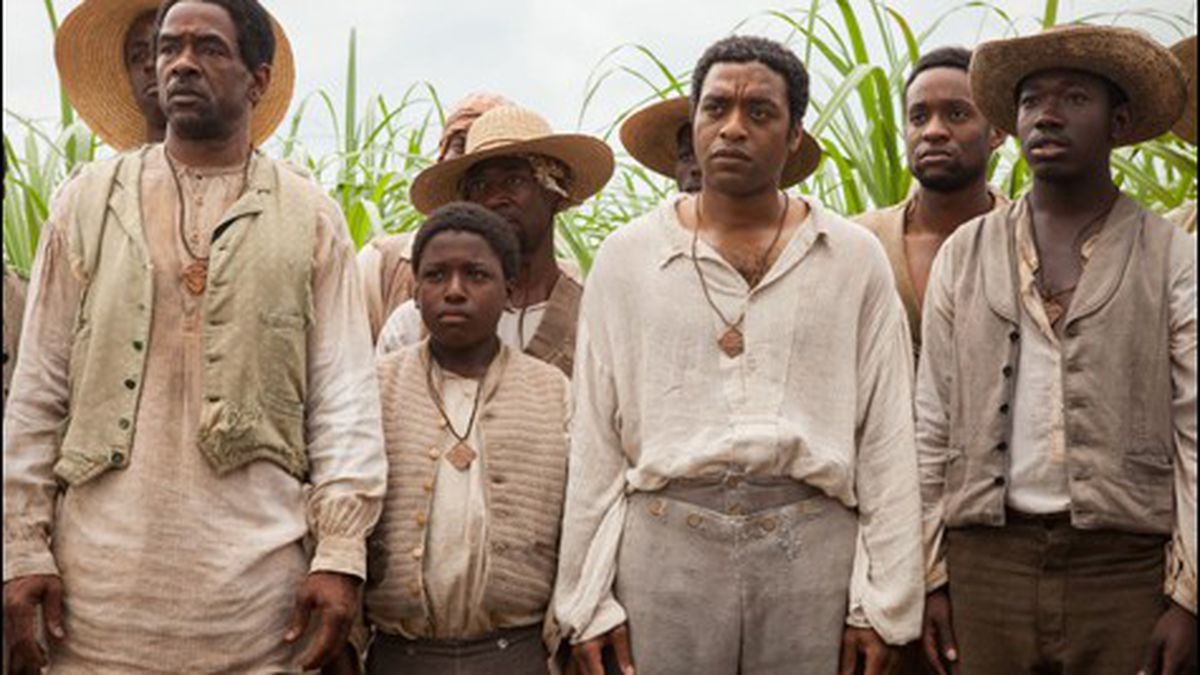We could be excused for coming to the conclusion, after witnessing Steve McQueen’s 12 Years a Slave, that American life in the mid-19th century was one long, unrelieved diorama of barbaric cruelty. The film certainly makes a striking case for that. The things that befall an African-American “freedman” named Solomon Northup (Chiwetel Ejiofor) after he is kidnapped into slavery in 1841 are as hideous as a horror movie — with the unsettling proviso that every insult he endures actually happened in real life.
And yet no one should really be surprised. If Northup’s experience comes as news to you, you haven’t been paying attention to a central narrative of the American experience. The legacy of slavery and racism and its relation to the African Diaspora form one of the major threads in this country’s story. The residual guilt, fear, hatred, and shame are everywhere around us. This disturbing, full-on histrionic melodrama is only the latest reminder of what has been here all along. It’s an ugly tale but we can’t afford to take our eyes off it.
Actor Ejiofor, a UK native of Nigerian heritage, has made a career playing black victims of white mischief in such films as Dirty Pretty Things, Savannah, and Amistad. Here, as genteel and cultured violinist Northup, a husband and father from Saratoga Springs, New York, he’s unwary enough to be lured by lying scoundrels to Washington, DC (where slavery was legal), liquored up, and kidnapped to the cane fields of Louisiana as a slave with the new name of Platt.
The overlords he meets set new standards for repulsiveness. Most demonic by far is Edwin Epps, played by Michael Fassbender, who starred for McQueen in Shame and Hunger. Cotton grower Epps, a crazed bible thumper, conflates maniacal sadism with his lust for champion cotton picker Patsey (Lupita Nyong’o) and delights in forcing his slaves to dance at macabre midnight “parties” in the big house, with his equally vile wife (Sarah Paulson) looking on. Fassbender overdoes it as usual. Maybe this director and actor should take a break from each other.
As in practically all such exposés, the slave owners and cruel henchmen are the ones under the microscope, not particularly the victims. We need to know what makes these monsters tick. Director McQueen, working from a script by writer John Ridley (Three Kings, TV’s Barbershop) based on Northup’s 1853 memoir, paints Northup/Platt as a proud man suffering from shock that never wears off. Every protest he makes is countered with a vengeance by the system, personified by a sterling cast of character actors: Benedict Cumberbatch as “kind” Master Ford; Paul Dano as the savage Tibeats; Paul Giamatti as slave dealer Theophilus Freeman; Garret Dillahunt as Armsby, the white slave; Bryan Batt as Judge Turner, and various lynch posses and snarling overseers. The lone righteous white man is a sympathetic Canadian named Bass, a namby-pamby role nabbed by producer Brad Pitt. He would have made a much better whiskey-soaked bullwhip cracker.
Northup’s fellow sufferers are sketched in hastily — most of them are killed or sold off before he gets to know them well. Patsey and Eliza (Adepero Oduye) are exceptions, along with Mistress Shaw (scene-stealing Alfre Woodard), the black slave wife of a white plantation owner. In a show-stopping interlude set on her front porch, the elegant Mrs. Shaw explains the facts of life to Northup: Being a kept woman is better than being human chattel, and we do what it takes to survive. Her ornate 19th-century English drives home the point unforgettably.
As always, the problem with any film about an institutionalized moral outrage like slavery — or the Holocaust, for that matter — is to rouse the audience’s pity and anger without tipping over into ridiculousness. Despite the lurid violence, McQueen is careful to tailor Northup’s tale for an audience who might have shied away from, say, Quentin Tarantino’s Django Unchained, not to mention the borderline grindhouse adaptations of novelist Kyle Onstott’s prurient Mandingo and Drum. McQueen’s “exploitation” is of the most deadly serious kind. That is, no matter how titillating the sex and mayhem might be, Solomon Northup’s ordeal must take the high road. It does, and McQueen’s damning vision of America — never mind Europe’s or Africa’s historical roles in the world slave trade — stings and stuns us. As it should.















